Five-year-old Mykyta cowers when he hears planes flying over London, fearing they are about to drop missiles. His classmate Polina mistakes police sirens for the dreaded air raid alarms. Both are scarred by the war they fled in Ukraine.
The heart-wrenching stories of the children taken in by England’s schools reveal the horror of Putin’s war: fleeing Russia’s bombs with all their worldly possessions in one suitcase; forced to leave their fathers behind. One child’s school has even been reduced to rubble.
But, by opening their doors to refugees, schools are helping to write a new chapter in the story – one full of love, compassion and hope instead.
Reporters Samantha Booth, Tom Belger and Freddie Whittaker visited and spoke to schools across the country to tell the story of the Ukrainian families they have taken in…
‘Childhood is lost’
The Balabanov family have had to rebuild their lives before, having fled Donetsk in 2014 at the start of the Donbas war.
Then, on February 24 this year, two hours after Russia invaded, the family of four crammed their car full of belongings and left Kviv to drive west.
“I woke up from some missiles hitting the city and explosions,” said Oleksandr, aged 15. “The main concern for my mum was that her children should not see a second of it, because it’s awful.”
They arrived in London nearly two months later after finding a sponsor family. But five-year-old Polina, Oleksandr’s younger sister, is still confused when police cars go by with sirens blaring, scared it is the sound of the air raid sirens heard across Ukraine since Russia invaded.
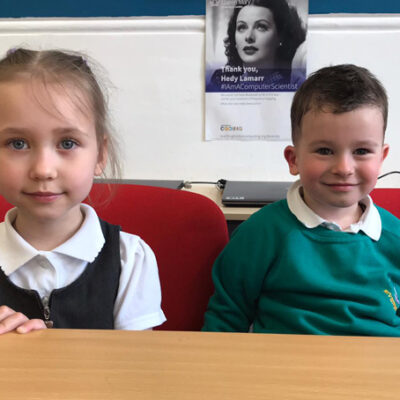
Oleksandr left behind a life of music. He was selected to represent Ukraine in the junior Eurovision song contest in 2020. His former school is still putting on Zoom lessons but he hopes to be placed in a school soon.
Polina now attends Riversdale Primary School, in south London, alongside five-year-old Mykyta Andrushchenko, who fled with his mother Viktoriia and grandmother Larysa from Bakhmut, in eastern Ukraine.
‘We heard explosions’
“We went for a walk, and we started to hear some noises, some explosions, and Mykyta started asking me what is going on,” English teacher Viktoriia said.
“He started to feel disturbed about the air raid that he would hear all the time and he would try and hide in the bathroom to not hear it. That was the key point when we decided to do something and to leave our country.”
When planes fly over London, Mykyta still asks if they are missiles. “He needs some time to forget, but is it possible for them to forget this experience?” Viktoriia wondered.
Both youngsters started at Riversdale – which has pupils who speak 42 different languages – just a day after visiting. According to headteacher Amy Roberts, Mykyta loved his new school jumper so much he would not take it off.
She said: “It’s a privilege to have people who trust us to look after their children. On that first day, the parents’ courage to walk away from their children was amazing.”
In East Sussex, television anchor Natasha Kaplinsky has taken in a Ukrainian family whose children now attend Cumnor House Sussex, an independent school for two to 13-year-olds.
The family arrived in England with just one suitcase of clothes and toys after fleeing through Poland from Lviv hours after the invasion began. On the journey they stayed in a cramped house with other families, watching the news for updates from their home country.
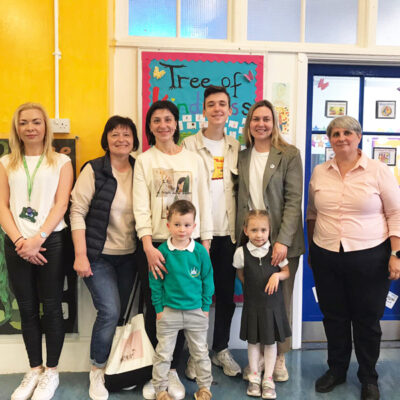
Their 12-year-old daughter Sonya was talking to her friend online in Poland last week when she heartbreakingly said: “Our childhood is over.”
Mother Anastasiia hopes that now Sonya and six-year-old Oleh are at school they will “find” this again: “When we came there it was surreal. In Ukraine, you see all of the stress, all the tears, all this pain and, after you cross the border, it’s like another world.”
Schools offer more than a warm welcome
Pupils are going above and beyond to help children, with one child offering Lego to Oleh and reducing parents to tears (see box out). But not only are they providing a warm welcome, many schools are offering significant tailored support from their own budgets.
Core Education Trust’s four schools launched a joint “Core Hello” programme for migrants and refugees in September. The Birmingham secondaries were already offering it to Afghan, Syrian and other refugees before two Ukrainians joined them in April.
They now learn together in small classes with a curriculum tweaked to focus on intensive language and reading support, and a language-specialist teacher.
In the 10-week programme, pupils make progress “which normally takes years” before returning to regular classes, according to Rekha Shell-Macleod, head of school at City Academy, which hosts the programme.
“And they learn simple things like crossing the road, where to catch a bus, how to navigate safely around the city – things we take for granted but which are hugely important for someone new to the country.”
For Jamie Barton, head of Jewellery Quarter Academy, the programme not only stops pupils being “thrown in with no English and asked to just get on with it”, it also lessens “culture shock” and builds belonging.
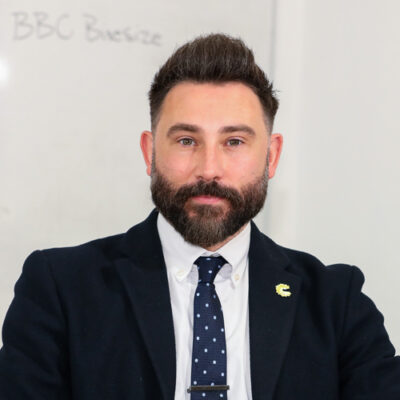
At Riversdale, the children will be offered “play therapy” by in-house therapists when ready, where they can re-enact any trauma and explore their feelings.
Like many London primary schools dealing with declining populations, Riversdale is undersubscribed so can take children in easily.
Teachers are used to helping those who have English as a second language, so use “clear messaging” and “lots of visual techniques”, Roberts said.
But funding delay causes friction
But some schools lack the support and resources to properly cater for their new pupils, with heads producing their own learning materials and calling for help from trauma experts.
Ministers have announced that local authorities will receive funding of between £3,000 and £8,755, to educate Ukrainian pupils depending on which school phase they are at. But Schools Week understands this will not be paid until July, right at the end of term and almost five months after Russia invaded Ukraine.
Education secretary Nadhim Zahawi has told schools to breach number limits to admit pupils. But leaders warned the lack of a separate admissions policy for refugees was creating confusion.
Caldecote Primary School, in Cambridgeshire, has taken in two pupils, Myroslava Starkova, 11, and Alihan Ysupov, 10. They fled Kharkiv when their school was reduced to “rubble”.
Co-headteacher Karen Standon described the admissions process as “pretty dire” and said there was little support available.
Under the school admissions code, refugees are prioritised for places, but alongside other groups of vulnerable children. A Schools Week investigation in 2019 revealed some youngsters waiting over 10 months to gain a place in school.
School’s Russian cleaner helps children
Caldecote has provided uniforms and bought books in Russian, the pupils’ first language. “We wanted to provide as much stability and normality for them as possible because it has been horrendous [for them],” Standon said.
The school has even DBS-checked its Russian cleaner to come in during afternoons to play games and help the children with conversational English.
“They’re well-schooled and understand all the routines of school, but they can’t speak to anybody,” Standon added. “So their days are just spent in this bubble, with us trying to use Google Translate.
“We’ve asked whether there is any support for books and resources. There really isn’t. We’ve just been relying on our community here.”
Cambridgeshire County Council said it was awaiting further guidance from the DfE but had briefed schools and provided an admissions guide.
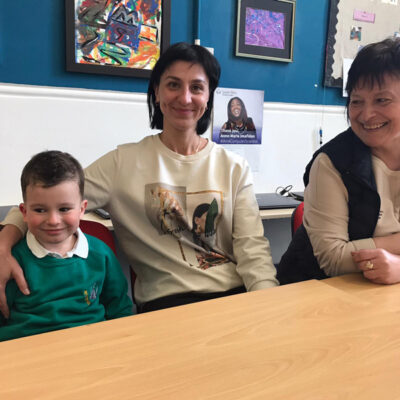
The government has also said schools should teach their “usual curriculum” to the new pupils, though this could be supplemented with the Ukrainian curriculum.
But Dan File, head of Elham Primary School in Kent, said teaching a normal curriculum was “absolutely not” realistic. The school is focusing on language acquisition for its current year 2 Ukrainian pupil.
File is also still waiting for the £6,580 from the government, adding the “main thing” needed was access to experts in trauma. “They’re kids, they only have one chance. It’s madness.
“They haven’t given anything to schools – no resources, we’ve been building our own.”
The government had previously encouraged heads to lend laptops provided during Covid to Ukrainian pupils.
Private school waive fees
Meanwhile, at least 100 private schools have pledged to take in Ukrainian, according to the Headmasters’ and Headmistresses’ Conference association.
Fees have been waived for the six refugees attending Cumnor House Sussex, for this term.
Fergus Llewellyn, headteacher, said it was “absolutely the right thing to do,” adding they can be “flexible because of the agility of our admissions processes”.
The children are not expected to learn, all subjects, such as Latin and instead are being given some extra English language support.
“Unlike many senior schools, we’ve got some freedom,” Llewellyn said. “I don’t have to worry about results because I don’t have a league table that I’m beholden to. I’m not saying we don’t have high expectations of our children, but we don’t have that pressure.”
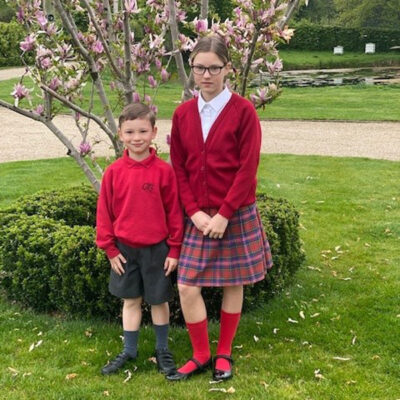
The Department for Education said it was “extremely grateful for the warm welcome, support and care that all schools are providing”. It is working to “refine our understanding of the costs we expect LAs will incur”.
Home Office figures show 46,100 people have arrived through its Ukraine family and sponsorship schemes, making up less than 1 per cent of Ukrainians who have fled abroad so far.
The department said it was unable to tell us how many Ukrainian children were in English schools because the data must be published officially first, which it has yet to do.
‘It’s like Hogwarts school’
Parents were reduced to tears when a kind-hearted year 5 boy offered his Lego to a six-year-old Ukrainian refugee to play with in his first week of school.
Unable to speak English, Oleh instead leapt up to hug Luca, who handed him a box full of toys at Cumnor House Sussex school. The family arrive in the school car park every morning to more donations from parents.
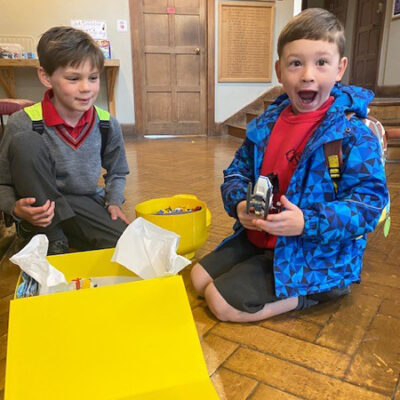
Mother Anastasiia said: “We are not used to receiving presents from strangers, we never knew it could be like this.”
Their other child, 12-year-old Sonya, has been baking with the host’s daughter Kika using Google Translate. For Ukrainian Mother’s Day this week, Kika made Anastasiia a blue and yellow cake.
Anastasiia added: “We always wanted to come [to England] but in different circumstances. When we came it was like all of the people were so heart-opened to us. We are really the lucky ones.”
In London, Kateryna Balabanov has been sending pictures of her daughter Polina at Riversdale Primary School back to relatives in Ukraine.
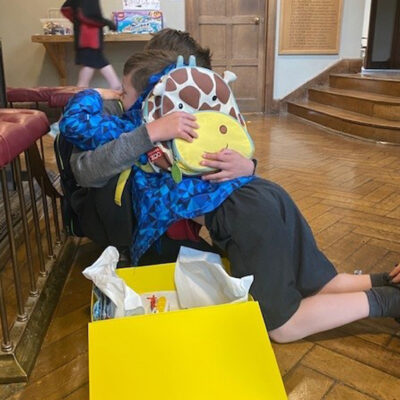
“Everyone is saying it’s like a castle, it’s like a Hogwarts school,” 15-year-old Oleksandr said. “On Polina’s second day, she was playing and she didn’t want to leave.
“She told us that she found a friend who only speaks English, and we asked what’s her name, and she said ‘I don’t know’.
“The language doesn’t matter much… from playing she can point at something and just use gestures. She is expanding her knowledge quite quickly.”
‘I want British people to come to see beautiful Ukraine, too’
War, family separation and a new country are not the only upheaval Ukrainian pupils are navigating. School life alone marks a significant change, going beyond language.
Yehor, 15, was surprised to receive a blazer and tie on joining Jewellery Quarter Academy last month. In Kyiv, only young or private school pupils usually wear uniforms, he said.
He also did not expect so many different nationalities, with 47 languages spoken at the Birmingham secondary. “You see more foreign tourists than other pupils in Ukraine,” he said through a translator.
While pupils’ mobile phones are a bugbear for staff and ministers here, Yehor said the situation was worse in Ukraine: “They play on them more during class – they’re told off, but still do it.”
His English is not as good as he thought, he added, with the language barrier the “biggest issue” he faces.

But he is grateful to be on Core Education Trust’s special language-focused programme for new arrivals. “It’s incredible services are helping us, and I have an opportunity to study English.”
He is already getting used to this “very unusual environment”.
Separation from his father and grandparents has “hurt”, however. His biggest hope is that the war will end and he can return. “I want British people to come to Ukraine and see how beautiful it is too.”
At the end of the interview, he broke into English unprompted. After teaching Schools Week how to say thank you (“dyakuyu”), he replied: “You’re welcome.”

















Your thoughts